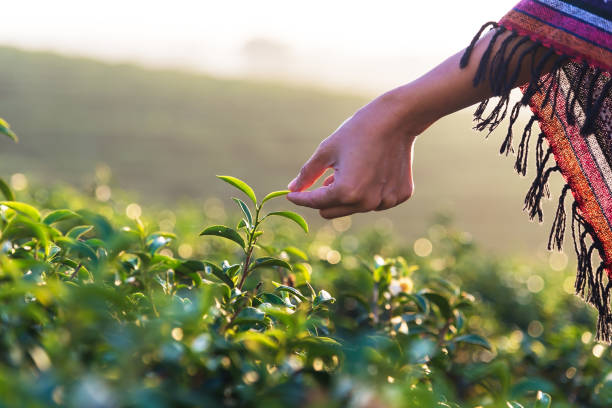
Beautiful asian woman harvest tea leaves in tea field in the morning.
Organic tea farming is a sustainable and environmentally friendly approach to cultivating tea, one of the world’s most beloved beverages. As consumers grow increasingly aware of the impact their choices have on the planet and their health, organic tea has emerged as a popular option for those seeking purity and quality. Unlike conventional tea farming, which often relies on synthetic chemicals to maximize yields, organic tea farming embraces natural methods to nurture the soil, protect the plants, and produce exceptional tea leaves. In this blog, we’ll explore the key practices that define organic tea farming, why they matter, and how you can support this eco-conscious movement—all while enjoying a delicious cup of tea.
What Is Organic Tea Farming?
Organic tea farming refers to the cultivation of tea plants under strict guidelines that prohibit the use of synthetic pesticides, herbicides, and fertilizers. Instead, farmers rely on natural techniques to maintain soil fertility, manage pests, and ensure the health of the tea plants. These practices are regulated by organic certification bodies, such as the USDA Organic or EU Organic programs, which set standards for every stage of production—from planting to processing.
The essence of organic tea farming lies in creating a balanced, self-sustaining ecosystem. This means prioritizing biodiversity, conserving water, and avoiding practices that harm the environment or the people working the land. The result is a cleaner, chemical-free tea that reflects the natural flavors of the plant and the care taken in its cultivation.
Soil Management in Organic Tea Farming
Healthy soil is the cornerstone of organic tea farming. Without synthetic fertilizers to artificially boost growth, organic farmers use natural methods to enrich the earth and support robust tea plants. Here are some of the key soil management practices:
- Composting: Organic farmers turn plant waste, animal manure, and other organic materials into nutrient-rich compost. This natural fertilizer improves soil structure, retains moisture, and provides essential nutrients like nitrogen and potassium to tea plants.
- Crop Rotation: To prevent soil exhaustion and reduce disease, farmers rotate tea crops with other plants, such as legumes. Legumes naturally fix nitrogen into the soil, enhancing its fertility without chemical inputs.
- Mulching: Layers of organic materials—like leaves, straw, or grass clippings—are spread around tea plants to conserve water, suppress weeds, and enrich the soil as they break down.
These techniques ensure that the soil remains fertile and productive over time, supporting tea plants without compromising the environment.
Pest Control in Organic Tea Farming
Managing pests without synthetic pesticides is a challenge that organic tea farmers tackle with ingenuity and nature-based solutions. Rather than resorting to chemicals that can harm ecosystems and leave residues on tea leaves, they use the following methods:
- Biological Control: Beneficial insects, such as ladybugs and parasitic wasps, are introduced to prey on pests like aphids and caterpillars. This natural predation keeps pest populations in check without disrupting the ecosystem.
- Companion Planting: Plants like marigolds, garlic, or mint are grown alongside tea bushes to repel insects. Their strong scents or chemical properties act as a natural deterrent to common pests.
- Natural Sprays: Organic farmers apply plant-derived solutions, such as neem oil or herbal extracts, to ward off pests. Neem oil, for instance, interferes with insect reproduction while remaining safe for beneficial bugs and the environment.
By focusing on prevention and ecological balance, organic tea farmers protect their crops while preserving the purity of the tea.
Harvesting Techniques in Organic Tea Farming
Harvesting organic tea is a meticulous process that emphasizes quality over quantity. Unlike conventional tea farms that may use machines for efficiency, organic tea is often hand-picked to ensure only the best leaves are selected. Here’s how it’s done:
- Selective Plucking: Skilled workers pluck only the youngest leaves and buds—typically the top two leaves and a bud—which are packed with flavor and nutrients. This selective approach enhances the tea’s quality.
- Seasonal Flushes: Organic tea is harvested in cycles, or “flushes,” throughout the growing season. Each flush yields leaves with unique characteristics influenced by weather and soil conditions.
- Minimal Processing: After harvesting, the leaves are processed with care—withered, rolled, oxidized (for black tea), and dried—to preserve their natural flavors and health benefits.
This hands-on approach ensures that organic tea retains its authenticity and delivers a superior taste experience.
Supporting Organic Tea Farming
Choosing organic tea is more than a personal preference—it’s a way to support sustainable agriculture and a healthier planet. Organic farming reduces the use of harmful chemicals, promotes biodiversity, and improves soil health, all of which contribute to a more resilient environment. Plus, it often supports fair labor practices, ensuring that farmers and workers are treated ethically.
If you’re wondering how to get started, it’s as simple as picking up a bag of organic tea from a trusted source. Many brands and retailers now offer organic options, making it easy to find teas that align with your values. Shop Tea at Backyard Brew to discover a range of organic teas that are sustainably sourced and bursting with flavor. By choosing organic, you’re not only enjoying a purer cup of tea but also voting with your wallet for farming practices that benefit the earth and its people.
Conclusion
Organic tea farming is a testament to the power of working in harmony with nature. From composting and companion planting to hand-picking the finest leaves, every practice is designed to produce tea that’s good for you and the planet. As awareness grows about the environmental and health benefits of organic products, this approach to tea farming offers a sustainable path forward—one that preserves ecosystems, supports farmers, and delivers exceptional quality. The next time you brew a cup of organic tea, take a moment to appreciate the dedication behind it and the positive impact your choice has on the world.
FAQs
- What makes tea organic?
Organic tea is grown without synthetic pesticides, herbicides, or fertilizers, following strict guidelines set by certification bodies. It relies on natural methods to maintain soil and plant health.
- Is organic tea better for your health?
Organic tea avoids chemical residues, making it a cleaner option. Many also believe it retains more antioxidants due to the natural growing conditions, though this can vary by tea type.
- How can I verify that my tea is organic?
Check for certification labels like USDA Organic, EU Organic, or similar seals from recognized organizations. These ensure the tea meets organic standards.
- Does organic tea taste different?
Some say organic tea offers a purer, more complex flavor because it’s grown in healthier soil and processed minimally. Taste differences depend on the tea variety and origin.
- Why is organic tea farming eco-friendly?
It reduces chemical pollution, enhances biodiversity, and improves soil and water quality. Organic practices also support sustainable livelihoods for farmers and workers.







